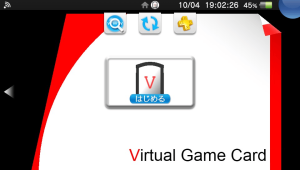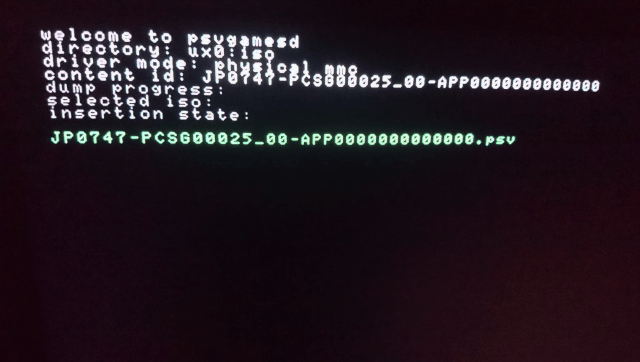More actions
No edit summary |
|||
| (2 intermediate revisions by the same user not shown) | |||
| Line 25: | Line 25: | ||
Application consists of user application that manages the driver settings and kernel plugin that is used to emulate game card. | Application consists of user application that manages the driver settings and kernel plugin that is used to emulate game card. | ||
==Installation== | ==Installation== | ||
| Line 38: | Line 33: | ||
Compatibility with sd2vita adapter: | Compatibility with sd2vita adapter: | ||
*This plugin is not compatible with sd2vita adapter and corresponding gamesd.skprx plugin. | *This plugin is not compatible with sd2vita adapter and corresponding [[Gamesd_Vita|gamesd.skprx plugin]]. | ||
*This plugin is not compatible with any other kernel plugin that is derived from gamesd.skprx. | *This plugin is not compatible with any other kernel plugin that is derived from gamesd.skprx. | ||
*If you are going to use this plugin - disable gamesd.skprx. | *If you are going to use this plugin - disable gamesd.skprx. | ||
| Line 63: | Line 58: | ||
* Current mode is indicated on line "driver mode:". | * Current mode is indicated on line "driver mode:". | ||
Physical MMC mode: | Physical MMC mode (produce game card dumps): | ||
* Insertion status is shown on line "content id:". | * Insertion status is shown on line "content id:". | ||
* Dump progress is shown on line "dump progress:". | * Dump progress is shown on line "dump progress:". | ||
* Dump file is stored at ux0:iso folder. | * Dump file is stored at ux0:iso folder. | ||
Virtual MMC mode/SD mode: | Virtual MMC mode/SD mode (running game card dump): | ||
*Selection status is shown on line "selected iso:". | *Selection status is shown on line "selected iso:". | ||
*Insertion status (insert/remove) is shown on line "insertion state:". | *Insertion status (insert/remove) is shown on line "insertion state:". | ||
| Line 217: | Line 212: | ||
==Credits== | ==Credits== | ||
* Thanks to Team molecule for HENkaku and thanks to Yifan Lu for taiHEN. | Disclaimer: | ||
* | *The removal and distribution of DRM content and/or circumventing copy protection mechanisms for any other purpose than archiving/preserving games you own licenses for is illegal. | ||
* | *This software is meant to be strictly reserved for your own PERSONAL USE. | ||
* | *The author does not take any responsibility for your actions using this software. | ||
Thanks to: | |||
* Team molecule for HENkaku and thanks to Yifan Lu for taiHEN. | |||
* Proxima for explaining klicensee theory. | |||
* SonyUSA for helping with initial testing. | |||
* al3xtjames for adding 3.63+ support. | |||
== External links == | == External links == | ||
Latest revision as of 13:55, 19 Ocak 2023
| PS Vita - Virtual Game Card | |
|---|---|
 | |
| General | |
| Author | motoharu |
| Type | Plugins |
| Version | 2.0 |
| License | MIT License |
| Last Updated | 2019/02/06 |
| Links | |
| Download | |
| Source | |
PS Vita - Virtual Game Card (psvgamesd) is an user application and kernel plugin that allow to produce game card dumps and run them.
This application is designed for two main tasks:
- Produce 1 to 1 dumps of game cards.
- Introduce functionality that allows to run these dumps.
Application consists of user application that manages the driver settings and kernel plugin that is used to emulate game card.
Installation
Before installing
Requirements:
- HENkaku
- taiHEN
Compatibility with sd2vita adapter:
- This plugin is not compatible with sd2vita adapter and corresponding gamesd.skprx plugin.
- This plugin is not compatible with any other kernel plugin that is derived from gamesd.skprx.
- If you are going to use this plugin - disable gamesd.skprx.
- Ideally it is recommended to remove sd2vita adapter. However when inserted - it should be ignored by this plugin.
Compatibility with game cards that have grw0: partition:
- There are some game cards that have write partition. It allows to write on game card.
- Currently such game cards are not supported. This is planned for next release.
- If you want to help me with this issue, please drop a comment at #10.
How to install
Install kernel plugin:
- Copy psvgamesd.skprx to the location where you have kernel plugins.
- Add the path to config.txt.
- Reboot your vita.
Install user app:
- Install psvgc.vpk.
- Virtual GC bubble will appear.
User guide
User interface
Upon launching user app you will be presented with console UI:
- Current mode is indicated on line "driver mode:".
Physical MMC mode (produce game card dumps):
- Insertion status is shown on line "content id:".
- Dump progress is shown on line "dump progress:".
- Dump file is stored at ux0:iso folder.
Virtual MMC mode/SD mode (running game card dump):
- Selection status is shown on line "selected iso:".
- Insertion status (insert/remove) is shown on line "insertion state:".
Use cases
Typical Emulation use case:
- Use physical mmc mode to produce 1:1 dump of the game card.
- Use virtual mmc or virtual sd mode to run the game.
Typical Physical Storage use case:
- Use physical mmc mode to produce 1:1 dump of the game card.
- Use your favorite tool or hex editor to burn this dump to SD card.
- Use physical sd mode to run the game.
Huge dump size, trimming, compression etc
Trimming zeroes:
Initial design of the format assumes that 1 to 1 dumps are produced. However you have a total freedom to derive a trimmed version of the dump from the original file. Ideal solution is to create a tool that does the trimming.
Solution for experienced users is to remove zeroes in the end of the file using hex editor. However you have to make sure that you are only deleting zeroes. You also have to keep in mind that data is 512 byte aligned. After trimming - you can set corresponding FLAG_TRIMMED flag in the header of the file.
Compression:
At this point in time compression does not make much sense since data in the dump is encrypted.
CMD56 handshake
Data from the handshake is required to pass signature checks and obtain klicensee. It is integrated into dump file.
When game card is inserted in physical mmc mode signature and keys are intercepted and saved to dump file later.
Dumper comparison
| psvgamesd | NoNpDrm | Vitamin/MaiDumpTool | |
|---|---|---|---|
| Dumps physical games | ✅ | ✅ | ✅ |
| Dumps digital games, DLC, and updates | ❌ | ✅ | ✅ |
| Compatible with legit DLC & updates | ✅ | ✅ | ❌ |
| Saves usable on non-hacked Vitas | ✅ | ✅ | ❌ |
| All original data untouched | ✅ | ❌ | ❌❌ |
| No problems saving after suspend | ✅ | ✅ | ❌❌ |
| Format can be converted to work with other tools | ✅ | ❌ | ❌ |
| Installs physical games as bubbles | ❌ | ✅ | ✅ |
| Dumps games requiring > 3.60 | ✅ | ❌ | ❌ |
| Works on firmware > 3.60 | ❌ | ❌ | ❌ |
| Plays games requiring > 3.60 | ❌ | ❌ | ❌ |
Key points:
- Stop using Vitamin/MaiDumpTool. Those tools were hacked together before taiHEN was ready and therefore depends on hacks around the fact that there was no kernel access. Game executable metadata was not preserved and creates lots of compatibility issues including corrupting saves while in suspend mode.
- psvgamesd creates
.psvfiles which will be the standard archival format for Vita games (like .iso or .nds but for Vita). These files are not trimmed or compressed and therefore will take a lot of storage to save. Until trimming/compression features are implemented, a way to use the best of both psvgamesd and NoNpDrm is to save your raw dumps on your computer (for backup) and when needed (like if you lose access to your cart), you can use psvgamesd to mount the image once, then use NoNpDrm to "install" it as a bubble (saving space) and finally delete the original.psvfrom your Vita. - psvgamesd allows you to backup your 3.61+ games for use if/once later firmware are hacked.
- psvgamesd currently does not support backing up digital games but the
.psvformat will eventually be used to archive digital games as well. More information on the format is here. - When a
.psvis mounted with psvgamesd, you can run any other tool (including NoNpDrm and Vitamin) on it, so until existing workflow (such as game translation) is upgraded to not depend on legacy dumps, it is always possible to go from.psvto any other format but not the other way around. You must dump the original cart to create a.psv.
Author's Legal Disclaimer: I helped author the .psv format to help standardize the format for backup and archival but I do not endorse any method to circumvent DRM. This guide is provided for informative purposes only and does not serve to aid any party in circumventing DRM. I have not worked directly or indirectly on any DRM circumvention features.
Controls
Console UI:
D-Pad Left/Right - Switch between different modes of the driver
Physical MMC mode - Producing Game Card Dumps:
Up/Down - Navigate through dump files
Cross - Start dumping the came card (only available if real game card is inserted)
Square - Stop dumping the came card (only available when dump process is started)
Triangle - Exit application
Virtual MMC mode/SD mode - Running Game Card Dump:
Up/Down - Navigate through dump files
Circle - Select game of interest
Start - Insert game card
Select - Remove game card
Triangle - Exit application
Physical SD mode - Running Game Card Dump:
Up/Down - Navigate through dump files
Triangle - Exit application
Screenshots

Known issues
Changelog
v2.0
- Add 3.63+ FW support.
Credits
Disclaimer:
- The removal and distribution of DRM content and/or circumventing copy protection mechanisms for any other purpose than archiving/preserving games you own licenses for is illegal.
- This software is meant to be strictly reserved for your own PERSONAL USE.
- The author does not take any responsibility for your actions using this software.
Thanks to:
- Team molecule for HENkaku and thanks to Yifan Lu for taiHEN.
- Proxima for explaining klicensee theory.
- SonyUSA for helping with initial testing.
- al3xtjames for adding 3.63+ support.
External links
- GitHub - https://github.com/motoharu-gosuto/psvgamesd
- VitaDB - https://vitadb.rinnegatamante.it/#/info/313
- Vita Dumper Comparison - https://gist.github.com/yifanlu/bcc8ebb102704ae136c650a912c6f70c
- Legacy ways to dump the came card - https://github.com/motoharu-gosuto/psvgamesd#legacy-ways-to-dump-the-came-card
